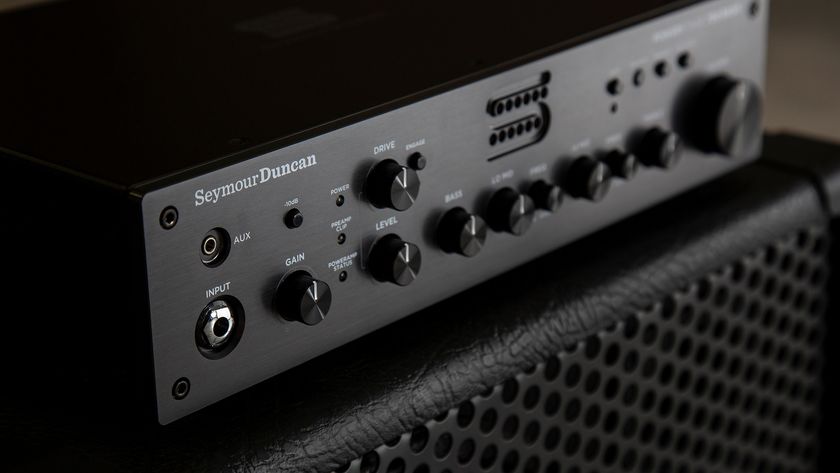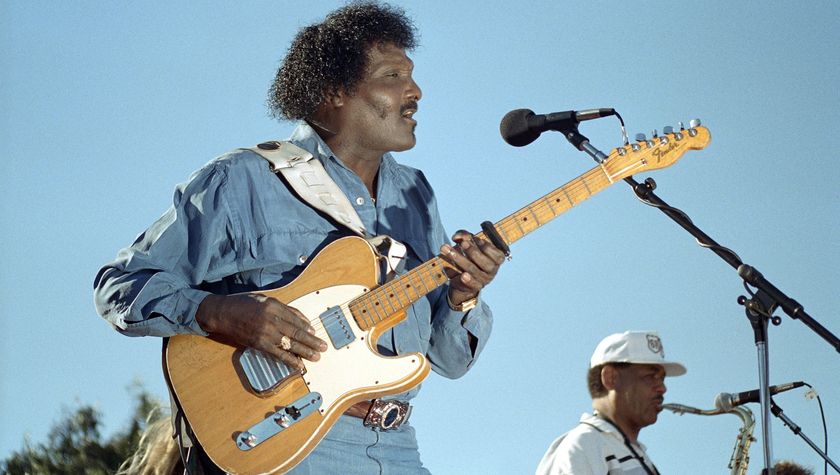Steve Vai Discusses Joe Satriani, Frank Zappa and Ry Cooder in 1987 Guitar World Interview
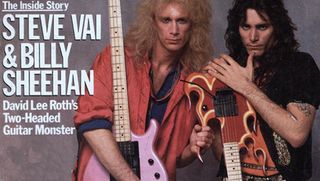
Here's our interview with Steve Vai from the March 1987 issue of Guitar World, which featured Vai and Billy Sheehan on the cover. The original story by Bill Milkowski started on page 36 and ran with the headline, "Steve Vai: The Sorcerer's Apprentice."
To see the Vai/Sheehan cover -- and all the GW covers from 1987 -- click here.
Steve Vai's career, thus far, has been a series of one hard act to follow after another.
First, he replaced Adrian Belew as the resident wang-bar king in Frank Zappa's band. Next, he replaced the incredible Yngwie Malmsteen in Alcatrazz. And now, as the lone guitarist in David Lee Roth's band, he has the dubious distinction of being compared to Eddie Van Halen, at least in the mind of the public.
It's a precarious position to be in, considering that there's no love lost between Roth and Van Halen. On the one hand, Vai has undying allegiance to his current employer, yet he greatly admires Edward's undeniable virtuosity. But this is war. The battle lines have been drawn and Vai is caught in the middle, trying to remain neutral during all the gunfire.
As the 26-year-old guitarist puts it, "I don't want to participate in any type of weird media war. I'm not that kind of guy. I mean, I love Edward and I love Dave. I'm happy for their success and I'm happy for our success and I don't really care what goes on between them. Mel I'm just gonna have a good time." End of discussion.
What is it about Italians and guitar? All through the years they have been innovators on the instrument: Eddie Lang (Salvatore Massaro), Joe Pass (Anthony Jacohi Passalaqua), Pat Martino (Pat Azzarra), Frank Zappa, Al Di Meola ... and now Steve Vai continues that legacy.
Get The Pick Newsletter
All the latest guitar news, interviews, lessons, reviews, deals and more, direct to your inbox!
Of course, if Eddie Lang were alive today he might not recognize what Vai does as guitar playing at all. The guy has evolved a vocabulary on the six-string that is Plutonian by traditional standards. The hammer-ons, the wang-bar tactics, the fleet-fingered facility, the sheer sonic inventiveness of it all is radical and revolutionary, albeit not without precedent.
Through countless hours of tedious woodshedding, Vai was able to attain a certain adeptness with the guitar, hut he didn't stop there. He continued to push himself, practicing, probing possibilities and searching for new sounds until he took it to a higher level.
Now, after an invaluable apprenticeship with Zappa and an interim period of self-assessment with Alcatrazz, Vai is coming into his own as a fully-realized instrumentalist. At this point, after honing his chops on a string of one-nighters all across America with the Roth band, Vai is at the top of his game. It's as if he thrives on the scrutiny. He knows who he's being compared to up there on stage and in spite of his respect for Edward The Great, he's not about to back down. On the contrary, he's pushing himself even harder. No time to rest now, he figures. Keep working, keep searching, stay hungry.
Consequently, he's improving (if you can believe that). In Zappa's band Steve played all the impossible guitar parts behind Frank's solo excursions, and connoisseurs were impressed. In Alcatrazz, he stepped forward as a strong soloist in his own right, and fans were amazed. Now with Roth, he's evolving to a higher plateau. He's playing like a man inspired, reaching peaks of ecstasy in the process. It's becoming second nature. He's breathing the music now. He's playing more with his heart and less with his head. It's flowing through him. He's finally expressing himself with his instrument.
"Now I'm able to not have to think about what I'm doing and it just comes out," he explains. "It has to do with your own frame of mind and your own consciousness. It's like being at one, expressing myself with my body and my guitar in a synchronized way. It's become a flow, an emotion, where I'll play a lick and my body will just go with it. It's a beautiful, beautiful feeling. It's taken me a little time to get there but it's beautiful when it happens.
"It's a channel and it's hard to induce. The sound of your amps has a lot to do with it because that’ll affect your frame of mind as you play. If everything sounds great, which it does most of the time, then it's easier to go into that void where you're able to just space out and communicate with your instrument and the audience."
To fully appreciate this enlightened stage at which Vai has finally arrived, you have to understand that he went through a very dark, desolate period to get there. It's a very personal subject; one that he doesn't wish to dwell on. But he does offer this:
"I was always a happy guy, you know, I mean, I was working for Frank Zappa, I was making money, I had a gig, I was fairly well respected in the music community, but something came over me. Sometimes you can't explain these things. Who knows what brings on depression' But it got to the point where I was questioning life at the time. I didn't understand what was going on. But nobody knew. I kept everything to myself, pretty much. Although I was a different guy on the outside, I guess. I felt like I had lost my sense of humor. And I felt like my body was deteriorating. It was a very black period in my life. And I realized that if I didn't do something, I would die."
He continues in a contemplative tone. ''I'm sure a lot of people can relate to what I'm saying. Something comes over you, you hit rock bottom ... then bang' You come right back up. You get through it, you figure it out, you learn from it. That happened to me. And I've been on an upswing ever since. I just keep getting happier and happier every day. And now, playing with Dave, I'm just ecstatic. It's the happiest I've ever been. And I thank God that I was able to start to really appreciate life, my friends, music. There's a lot of things I'd like to talk about and maybe someday I will. But right now, at this point in my career, I don't want to say certain things that might give people the wrong impression. Let's keep it positive."
Vai grew up in Long Island. where he came under the spell of guitar at age 13. It was Jimmy Page's solo on "Heartbreaker" that initially grabbed him. "I had never heard anybody play that fast," he recalls. "By today's standards it might not be one of the greatest guitar solos on record. But back then, for me, it meant a lot. Both the technique and the emotion involved in that particular solo really grabbed me. And even today I still love it."
He began playing at age 14 and soon came under the tutelage of Joe Satriani, who became a towering influence on the young guitarist. "I took lessons with him for three years and he was very good because he didn't tell me that I had to play like him or that I had to do things this way or that way. He explained why it was important for me to figure out things on my own
Satriani was the guy who introduced Vai to the joys of wang bar. "He was one of the most musical people I ever met and he did a lot of things with the bar that I watched and learned from ." Satriani is also responsible for impressing on Vai the virtue of "big ears."
"He could listen to a record and tell you in words exactly what was going on harmonically -- the chord changes, the voicings, intervals and everything. I saw him do that and I said. 'I gotta be able to do this. I want to be like this guy.' It wasn't long before Jimi Hendrix came along to make another lasting impression on Vai's psyche.
"I think Hendrix influenced me more spiritually than anything else." he says. "His whole approach was so inspiring. Just his feel, spiritually, of what he was doing is what sent me. He was doing it instinctively with no precedent or no other examples to copy. You never really heard anyone else who sounded anything like him. Whereas if you hear someone like me you might say, 'Well, he sounds a little hit like this guy or that guy.' But Hendrix, man he must've been from Venus or something."
Upon enrolling in the Berklee College of Music in Boston, Vai began studying theory with trumpeter Mike Metheny (Pat's brother) and trumpeter Wes Hensel who taught him a lot about writing for woodwinds. It was at Berklee that Vai learned to sight read.
"Oh God, what a task! I think the guitar is one of the hardest instruments to Sight read on. But one summer I was determined to learn. I said. 'This does it! I am gonna sit here all summer and become a great sight-reader.' I went to the library and got so many books -- violin books, saxophone books, flute books, everything. And lemme tell ya, it was hard. But it paid off."
Vai spent a lot of time transcribing Frank Zappa music during his term at Berklee. Later, when he joined Frank's outfit, he would put in even more time in transcribing.
"I was literally working 10 hours a day doing nothing but transcribing," he recalls. "All day, every day. I was transcribing guitar solos lead sheets, orchestra parts. There's a stack of stuff at my house that's four feet high. There's a book of guitar parts and drum parts from Frank's music that's four inches thick. So when I was with him. I was working on Frank's music all day, every day whether I was learning it on the guitar, practicing or transcribing it. That's all I did. That's why I got along great with Frank. I was very dedicated to his music. It's what he needs out of his employees.
"And through all the transcribing, it's made it possible for me to hear things and visualize them on my instrument better and see them on paper better. Now I can look at a piece of music and pretty much have an idea of what it's going to sound like, just by looking at it. Or if I get an idea for a melody line. I can instantly commit it to paper, just like I'm writing a letter to somebody. It's not a hard thing to do. It's just a question of sitting down and doing it and being disciplined about it. I learned that much from Frank."
Vai has particularly high regard for Zappa's perfectionist tendencies. It's one of the things that rubbed off on Vai during his three-year period with ol' FZ. Listen to Vai's self-produced album, Flex-able to hear what else rubbed off on him.
Says Vai of the maestro. "Frank Zappa is a very dedicated musician. He's very, very demanding of himself, more so than anybody l’ve ever seen in any medium at all. And that comes through in both the quantity and the quality of the music he produces. For me, it's music of the highest quality. I love Frank's music. And being able to watch him create that music is a real thrill in itself. It makes you think. 'Why don't I apply myself like that?’ It's really inspiring, his example. The man is amazing."
In spite of his obvious respect for the man and his music, Vai never really got much of a chance to stretch out and solo in Zappa's band, with the exception of one showcase tune, "Stevie's Spanking." This was Vai 's one chance to pull out all the stops, lay on the wang bar, thrash and flail 'til his heart's content. As he puts it, "That was Frank's way of throwing me a piece of meat there."
One of his other great accomplishments in Zappa's band was his work on the cut "Jazz Discharge Party Hats" from Man From Utopia. For this piece, Vai had to transcribe an impromptu spoken-word rap that Zappa delivers in concert.
Notating the natural rises and falls in the pitch of Frank's voice during this meandering discourse on skinny-dipping with groupies and other hijinks on the road, Vai then went into the studio and overdubbed an identical unison line on acoustic guitar, covering every word, every laugh, every er, ah and um that Frank uttered. It was a triumph of transcription. Vai calls it, "The hardest thing I ever tried to do. It took me so long to transcribe that and then to learn it on the guitar. It was such a chore. But after I had it down and after I practiced it until I was blue in the face, it was such a joy, such a riot."
Since leaving Zappa's employ, Vai's career has prospered. The Flex-able project was a considerable feat in itself, but there was much more to follow. Hooking up with Alcatrazz in the fall of '84 gave him a new vehicle in which to burn. His playing on the group's Disturbing The Peace album (released in '85 on Capitol) shows a confident Vai in full command of his powers. Check out his triple-track unison solo on "Painted Lover," his two-handed virtuosity on "God Bless Video" and his insane solo showcase on "Lighter Shade Of Green."
There followed two notable session dates-work on Indian violinist L. Shankar's pop project for ECM, Epidemics, and featured soloing on the Bill Laswell-produced PIL project for John Lydon on Elektra Records.
On
Epidemics
, Vai is joined by former Brand X bassist Percy Jones. His playing on this album is fairly pedestrian, but his presence there creates an edge on an otherwise tame pop project. There are the patented Vai sound effects throughout. On "No Cure" he recreates the sick sound of a "vomiting" guitar that Jeff Beck so successfully pioneered on
Truth
. There are wicked intros and brief interludes, but no extended soloing per se, with the exception of "Full Moon," in which he scratches, scrapes and howls with his ax.
On Album, the infamous generic PIL project, Vai 's playing is much more aggressive, possibly to complement the fierceness and nastiness of Lydon's snarling vocals. All the patented wang-bar tactics are very much in evidence and his playing in general is more dissonant, more "out" than he had previously exhibited on record. Of particular note is his manic solo on "Fishing," with its flurry of 32nd notes at the tag (in harmony, yeti), his screaming digital-repeat wail on "Home" and his awesome display on "Ease," possibly his greatest solo on record.
The tune proceeds without much fanfare when suddenly Vai explodes for two-and-a-half minutes of unabashed madness-hammer-ons, nasty wang-bar stuff, flurries of 32nd notes, taking it out on the tag in a blaze of sonic insanity.
One other project came Vai's way before hooking up with Roth. A film project. Namely, his contribution to the film Crossroads, the story of a young white blues enthusiast (portrayed by Ralph Macchio) who seeks the truth from a wizened old bluesman of the South. Vai not only contributes guitar parts to the soundtrack, he also appears on screen as Jack Butler, the satanic figure playing a wicked six-string.
Being in the film was a kick, says Vai , but working side-by-side on the soundtrack with Ry Cooder was something of a revelation for Steve.
"Ry Cooder is one of the best groove players I've ever witnessed in my life," he says with enthusiasm. " I've never seen anybody so strong in the groove. I practiced on time a lot. For a long period, from 1980 to 198I, I concentrated totally on my sense of timing. It's something you really gotta keep in touch with. That's one of the first things that goes when you don't concentrate on it; for me, that is. So I practiced a lot and got it together, then left it for a while and was slapped in the face when I played with Ry Cooder. He is truly a living, breathing master."
Vai and Cooder collaborated closely on the film's finale, the showdown sequence in which the devilish Jack Butler challenges the young blues apprentice to a Six-string duel. "I'm playing all my parts," says Steve, "and when the other guy goes into his classic al fast thing, that's me, too. I think Ry did a lot of the other stuff with Arlen Roth, who for some reason didn't get proper credit in the film. Arlen worked very hard on the project. He taught Ralph Macchio how to hold and finger the guitar to make it look realistic. And he recorded a lot of the slide guitar parts throughout the film, along with Ry."
Credit where credit is due.
Which brings us to Eat 'Em And Smile. Vai struts his virtuoso stuff throughout this killer album. It's the most diverse package of sounds that Steve has ever been associated with. From the talking wah-wah intro on "Yankee Rose" to the synchronized hyperdrive of "Elephant Gun" and "Big Trouble" to his Hendrix-cum-Wes octave playing on "Ladies Nite In Buffalo," it's easily Vai's most versatile performance to date.
And dig his B.B. King-styled solo on "Shy Boy" or his mellow jazzbo comping on the big-band chart to "That's Life," the Sinatra anthem. Or his cool finger-picked chording (courtesy of Cooder) on "Goin' Crazy." Yngwie couldn't do all this.
Vai's talent goes well beyond the obvious wang-bar theatrics and two-handed pyrotechnics. Yes, he has evolved a whole lexicon of expression for each of those modern-day flash techniques. Yes, he flies around the stage in tight pants, enticing the girlies. But he's not your average lunkhead. The guy's a musician, an artist. We're going to be hearing from him well into the 21st century.
I can just picture Vai in the year 2035, a lively, young-at-heart septuagenarian hunched over some exotic, laser-driven multi-stringed instrument, performing classical works at a music symposium convening on the moon. But I digress.
Coming back down to earth, Vai puts his career into perspective. "Of course, there are certain things I can't do on a David Lee Roth album that I can do on a solo album or some other outside project. But right now, we're in this for a while. We're hoping that this is going to stick together so we can do a few more albums and tours. I mean, I love playing with Dave. He's got a great sense of humor, which is something I need, especially on the road. And he gives me all the rope I need. I get to express myself the way I like in this band, which is great."
He pauses and adds with a chuckle, "And if I were to do a solo album, it would be strictly for guitar players. You know. 'Check this out, you guys. 'Just to express myself in another area and to give other guitarists a kick." I can't wait for that one.
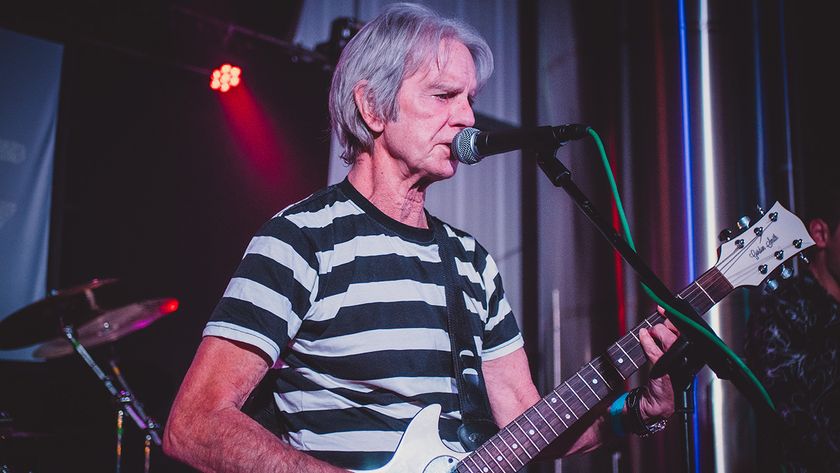
“I get asked, ‘What’s it like being a one-hit wonder?’ I say, ‘It’s better than being a no-hit wonder!’” The Vapors’ hit Turning Japanese was born at 4AM, but came to life when two guitarists were stuck into the same booth
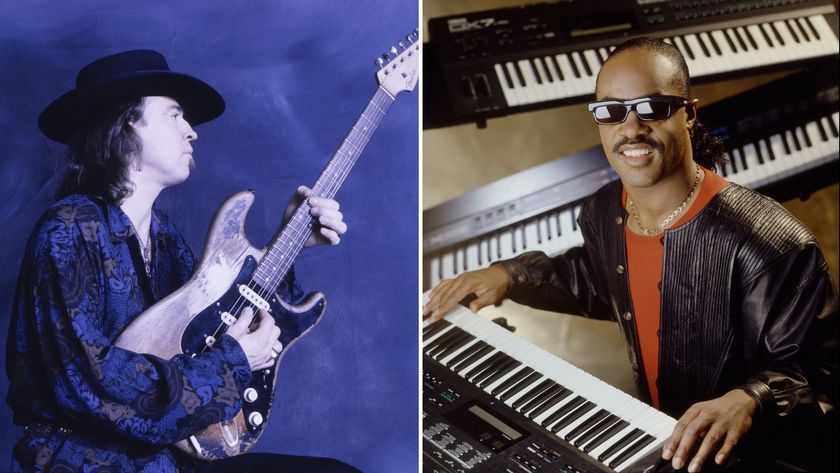
“Let's play... you start it off now, Stevie”: That time Stevie Wonder jammed with Stevie Ray Vaughan... and played SRV's number one Strat
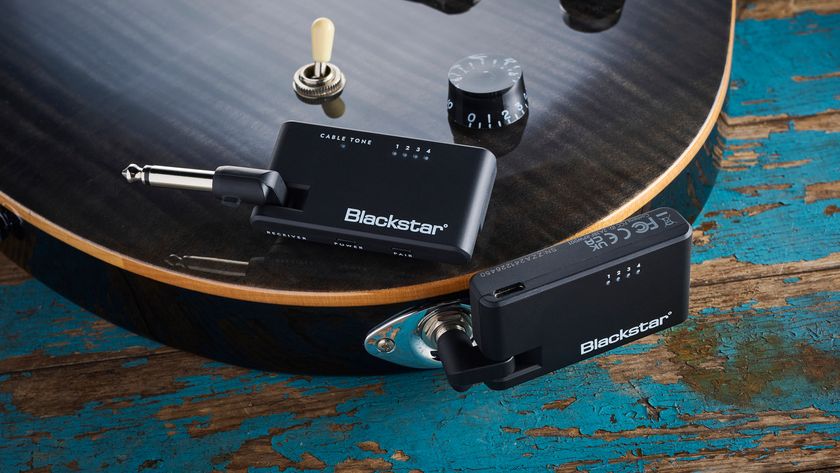
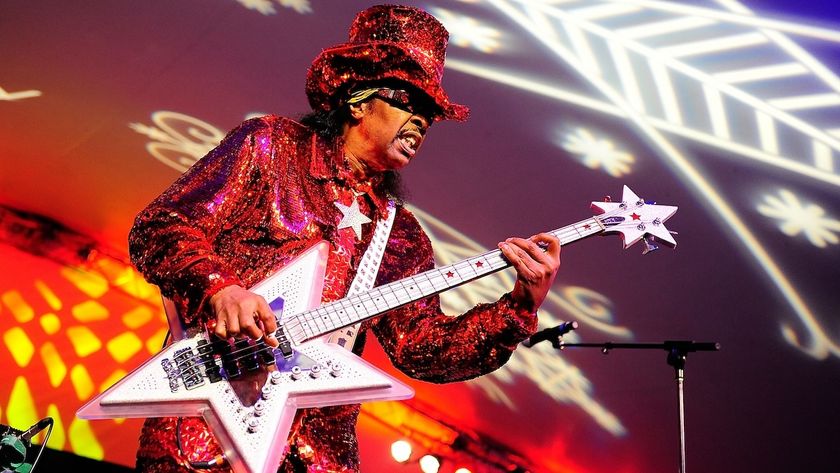
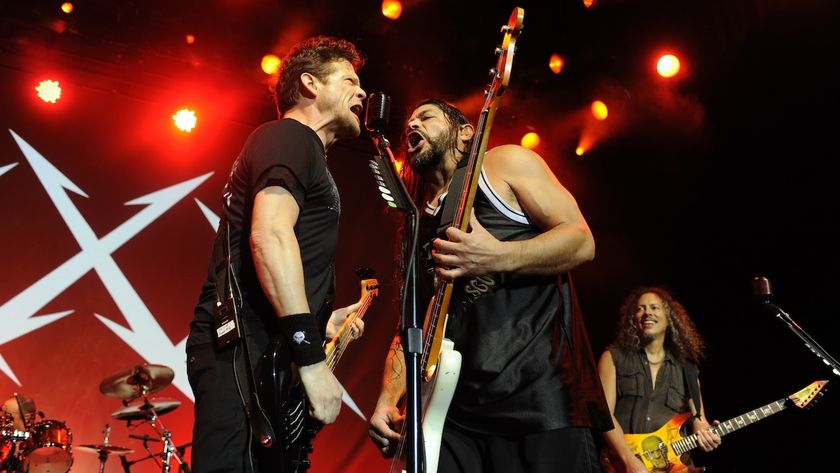
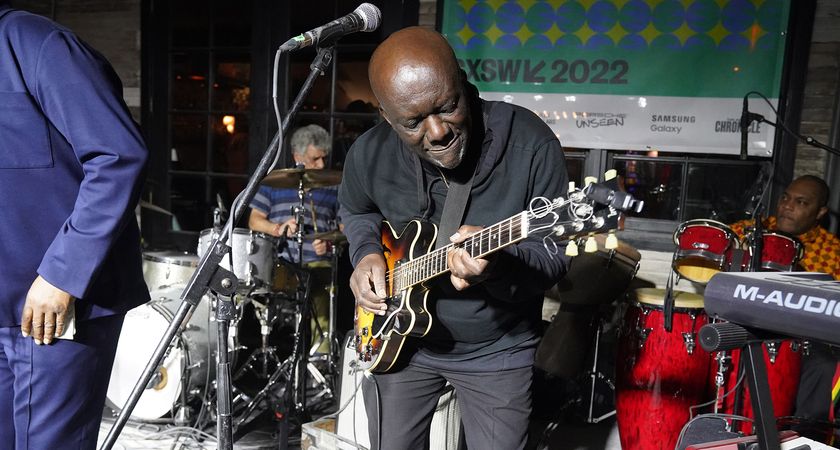
![[L-R] George Harrison, Aashish Khan and John Barham collaborate in the studio](https://cdn.mos.cms.futurecdn.net/VANJajEM56nLiJATg4P5Po-840-80.jpg)
